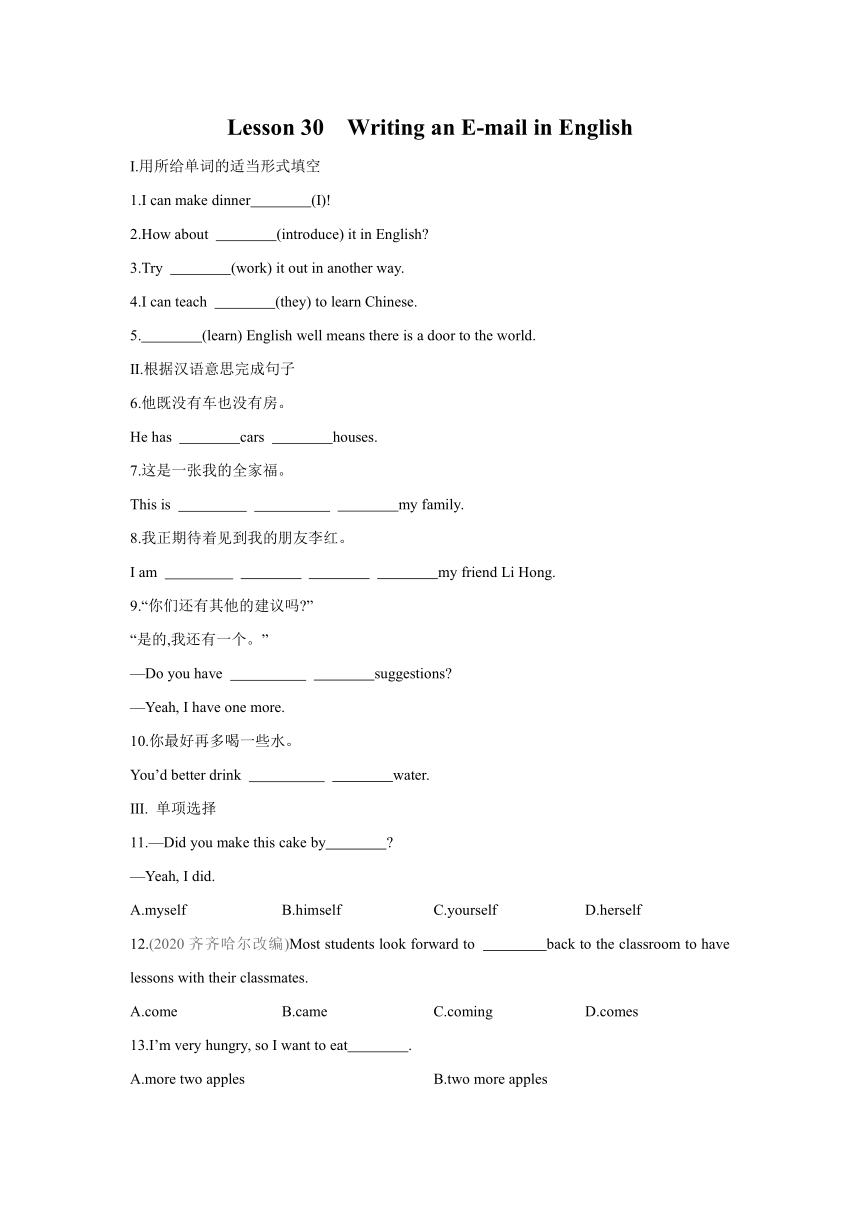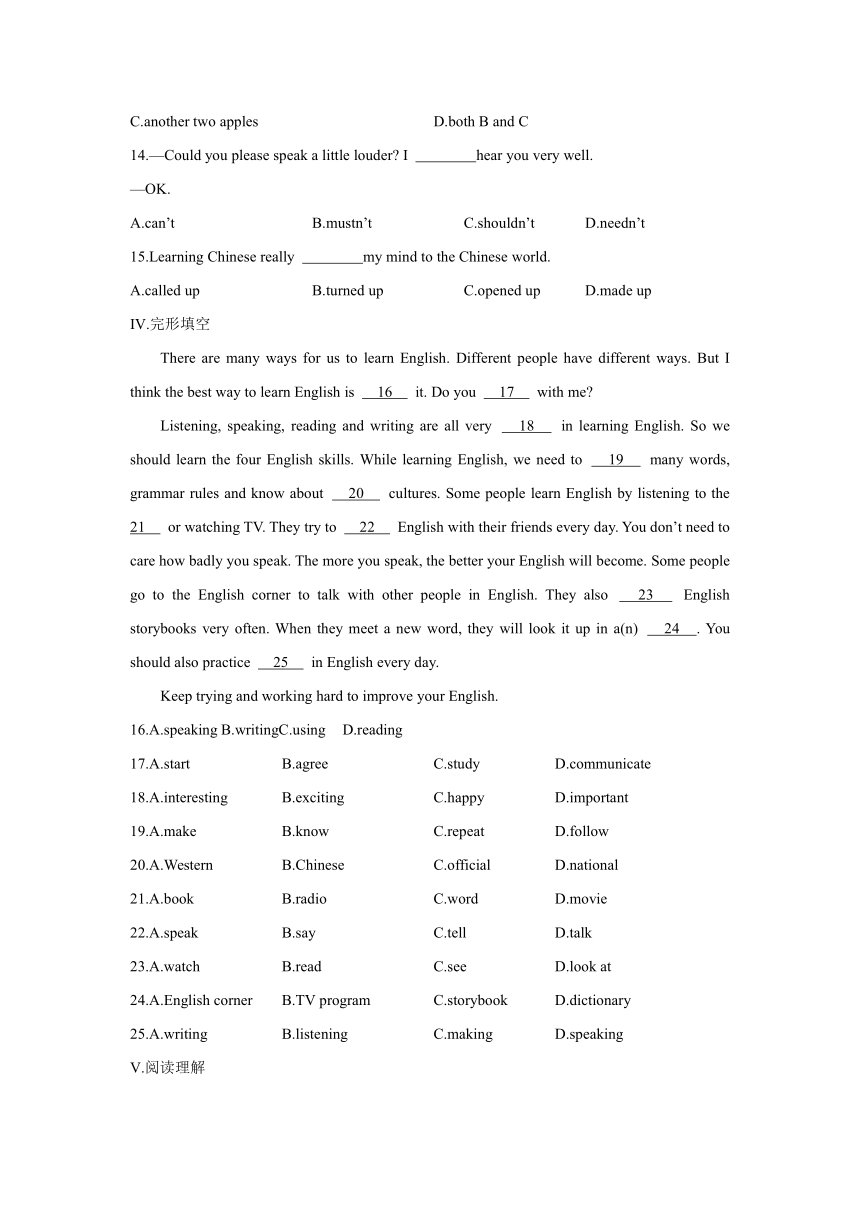Unit5 Lesson 30 Writing an E-mail in English课时练习(含答案)
文档属性
| 名称 | Unit5 Lesson 30 Writing an E-mail in English课时练习(含答案) |  | |
| 格式 | docx | ||
| 文件大小 | 43.5KB | ||
| 资源类型 | 教案 | ||
| 版本资源 | 冀教版 | ||
| 科目 | 英语 | ||
| 更新时间 | 2022-04-12 08:58:18 | ||
图片预览


文档简介
Lesson 30 Writing an E-mail in English
Ⅰ.用所给单词的适当形式填空
1.I can make dinner (I)!
2.How about (introduce) it in English
3.Try (work) it out in another way.
4.I can teach (they) to learn Chinese.
5. (learn) English well means there is a door to the world.
Ⅱ.根据汉语意思完成句子
6.他既没有车也没有房。
He has cars houses.
7.这是一张我的全家福。
This is my family.
8.我正期待着见到我的朋友李红。
I am my friend Li Hong.
9.“你们还有其他的建议吗 ”
“是的,我还有一个。”
—Do you have suggestions
—Yeah, I have one more.
10.你最好再多喝一些水。
You’d better drink water.
Ⅲ. 单项选择
11.—Did you make this cake by
—Yeah, I did.
A.myself B.himself C.yourself D.herself
12.(2020齐齐哈尔改编)Most students look forward to back to the classroom to have lessons with their classmates.
A.come B.came C.coming D.comes
13.I’m very hungry, so I want to eat .
A.more two apples B.two more apples
C.another two apples D.both B and C
14.—Could you please speak a little louder I hear you very well.
—OK.
A.can’t B.mustn’t C.shouldn’t D.needn’t
15.Learning Chinese really my mind to the Chinese world.
A.called up B.turned up C.opened up D.made up
Ⅳ.完形填空
There are many ways for us to learn English. Different people have different ways. But I think the best way to learn English is 16 it. Do you 17 with me
Listening, speaking, reading and writing are all very 18 in learning English. So we should learn the four English skills. While learning English, we need to 19 many words, grammar rules and know about 20 cultures. Some people learn English by listening to the 21 or watching TV. They try to 22 English with their friends every day. You don’t need to care how badly you speak. The more you speak, the better your English will become. Some people go to the English corner to talk with other people in English. They also 23 English storybooks very often. When they meet a new word, they will look it up in a(n) 24 . You should also practice 25 in English every day.
Keep trying and working hard to improve your English.
16.A.speaking B.writingC.using D.reading
17.A.start B.agree C.study D.communicate
18.A.interesting B.exciting C.happy D.important
19.A.make B.know C.repeat D.follow
20.A.Western B.Chinese C.official D.national
21.A.book B.radio C.word D.movie
22.A.speak B.say C.tell D.talk
23.A.watch B.read C.see D.look at
24.A.English corner B.TV program C.storybook D.dictionary
25.A.writing B.listening C.making D.speaking
Ⅴ.阅读理解
Richard Campbell is a secondary school student. He is 15 years old. He lives in a small town in the north of England. Every morning, he gets up at eight o’clock, puts on his uniform and walks to school.
One hour later, the lessons start. The students usually study maths, English, history and geography in the morning. They usually study music and drawing and they play sports after lunch. They have a ten-minute break between classes. They also spend a long time in the school library, reading books and doing their homework.
Richard likes his school very much. His favourite subjects are English and geography, but he doesn’t like maths because he is not good at it.
Richard and all his friends spend the whole day at school. Lunch is at one o’clock. He doesn’t like the food that the school serves(提供). This is why he often brings a packed lunch from home. He always has his lunch in the dining hall, but some of his friends sometimes eat in the courtyard or outside the school gate.
At weekends, he always goes out with his friends because he doesn’t go to school. On Saturday, he always goes to the cinema or to the sports centre. On Sunday, he just goes for a walk with his dog.
26.What time do Richard’s lessons begin in the morning
A.At 8:00. B.At 8:30. C.At 9:00. D.At 9:10.
27.What does Richard like best
A.Maths and English. B.English and geography.
C.History and maths. D.Geography and history.
28.Where does Richard have lunch on weekdays
A.In the dining hall. B.At home.
C.In the courtyard. D.Outside his school gate.
29.What does Richard always do on Saturday
A.He reads and does homework.
B.He goes to see films or does sports.
C.He walks his dog or does exercise.
D.He spends a long time in the library.
答案
Lesson 30 Writing an E-mail in English
Ⅰ.1.myself 2.introducing 3.to work/working 4.them 5.Learning
Ⅱ.6.no; or 7.a picture/photo of 8.looking forward to meeting/seeing
9.any other 10.some more
Ⅲ.11.C
12.C 考查非谓语动词。句意:“大部分学生盼望着回到教室和同班同学们一起上课。”look forward to doing sth意为“盼望着做某事”,其中的to 是介词,后面可接名词或动名词形式。故选C。
13.D 14.A 15.C
Ⅳ.16.C 17.B 18.D 19.B 20.A
21.B 22.A 23.B
24.D 由句意“当他们遇到一个新单词时,他们就会在词典里查找它”可知选D。
25.A
Ⅴ.26—29 CBAB
Ⅰ.用所给单词的适当形式填空
1.I can make dinner (I)!
2.How about (introduce) it in English
3.Try (work) it out in another way.
4.I can teach (they) to learn Chinese.
5. (learn) English well means there is a door to the world.
Ⅱ.根据汉语意思完成句子
6.他既没有车也没有房。
He has cars houses.
7.这是一张我的全家福。
This is my family.
8.我正期待着见到我的朋友李红。
I am my friend Li Hong.
9.“你们还有其他的建议吗 ”
“是的,我还有一个。”
—Do you have suggestions
—Yeah, I have one more.
10.你最好再多喝一些水。
You’d better drink water.
Ⅲ. 单项选择
11.—Did you make this cake by
—Yeah, I did.
A.myself B.himself C.yourself D.herself
12.(2020齐齐哈尔改编)Most students look forward to back to the classroom to have lessons with their classmates.
A.come B.came C.coming D.comes
13.I’m very hungry, so I want to eat .
A.more two apples B.two more apples
C.another two apples D.both B and C
14.—Could you please speak a little louder I hear you very well.
—OK.
A.can’t B.mustn’t C.shouldn’t D.needn’t
15.Learning Chinese really my mind to the Chinese world.
A.called up B.turned up C.opened up D.made up
Ⅳ.完形填空
There are many ways for us to learn English. Different people have different ways. But I think the best way to learn English is 16 it. Do you 17 with me
Listening, speaking, reading and writing are all very 18 in learning English. So we should learn the four English skills. While learning English, we need to 19 many words, grammar rules and know about 20 cultures. Some people learn English by listening to the 21 or watching TV. They try to 22 English with their friends every day. You don’t need to care how badly you speak. The more you speak, the better your English will become. Some people go to the English corner to talk with other people in English. They also 23 English storybooks very often. When they meet a new word, they will look it up in a(n) 24 . You should also practice 25 in English every day.
Keep trying and working hard to improve your English.
16.A.speaking B.writingC.using D.reading
17.A.start B.agree C.study D.communicate
18.A.interesting B.exciting C.happy D.important
19.A.make B.know C.repeat D.follow
20.A.Western B.Chinese C.official D.national
21.A.book B.radio C.word D.movie
22.A.speak B.say C.tell D.talk
23.A.watch B.read C.see D.look at
24.A.English corner B.TV program C.storybook D.dictionary
25.A.writing B.listening C.making D.speaking
Ⅴ.阅读理解
Richard Campbell is a secondary school student. He is 15 years old. He lives in a small town in the north of England. Every morning, he gets up at eight o’clock, puts on his uniform and walks to school.
One hour later, the lessons start. The students usually study maths, English, history and geography in the morning. They usually study music and drawing and they play sports after lunch. They have a ten-minute break between classes. They also spend a long time in the school library, reading books and doing their homework.
Richard likes his school very much. His favourite subjects are English and geography, but he doesn’t like maths because he is not good at it.
Richard and all his friends spend the whole day at school. Lunch is at one o’clock. He doesn’t like the food that the school serves(提供). This is why he often brings a packed lunch from home. He always has his lunch in the dining hall, but some of his friends sometimes eat in the courtyard or outside the school gate.
At weekends, he always goes out with his friends because he doesn’t go to school. On Saturday, he always goes to the cinema or to the sports centre. On Sunday, he just goes for a walk with his dog.
26.What time do Richard’s lessons begin in the morning
A.At 8:00. B.At 8:30. C.At 9:00. D.At 9:10.
27.What does Richard like best
A.Maths and English. B.English and geography.
C.History and maths. D.Geography and history.
28.Where does Richard have lunch on weekdays
A.In the dining hall. B.At home.
C.In the courtyard. D.Outside his school gate.
29.What does Richard always do on Saturday
A.He reads and does homework.
B.He goes to see films or does sports.
C.He walks his dog or does exercise.
D.He spends a long time in the library.
答案
Lesson 30 Writing an E-mail in English
Ⅰ.1.myself 2.introducing 3.to work/working 4.them 5.Learning
Ⅱ.6.no; or 7.a picture/photo of 8.looking forward to meeting/seeing
9.any other 10.some more
Ⅲ.11.C
12.C 考查非谓语动词。句意:“大部分学生盼望着回到教室和同班同学们一起上课。”look forward to doing sth意为“盼望着做某事”,其中的to 是介词,后面可接名词或动名词形式。故选C。
13.D 14.A 15.C
Ⅳ.16.C 17.B 18.D 19.B 20.A
21.B 22.A 23.B
24.D 由句意“当他们遇到一个新单词时,他们就会在词典里查找它”可知选D。
25.A
Ⅴ.26—29 CBAB
同课章节目录
- Unit 1 A Trip to the Silk Road
- Lesson 1 A Trip to China
- Lesson 2 Meet You in Beijing
- Lesson 3 A Visit to Xi'an
- Lesson 4 A Visit to Lanzhou
- Lesson 5 Another Stop along the Silk Road
- Lesson 6 Jenny's Diary
- Unit 2 It's Show Time!
- Lesson 7 What's Your Project about?
- Lesson 8 Marco Polo and the Silk Road
- Lesson 9 Danny's School Project
- Lesson 10 Music and Dance
- Lesson 11 Food in China
- Lesson 12 A Blog about the Silk Road
- Unit 3 School Life
- Lesson 13 How Is School Going?
- Lesson 14 Jenny's School Life
- Lesson 15 Making a Difference
- Lesson 16 We Are with You!
- Lesson 17 School Science Fai
- Lesson 18 Teaching in China
- Unit 4 After-School Activities
- Lesson 19 A Dinner Date
- Lesson 20 Join Our Club!
- Lesson 21 What Is Your Club Type?
- Lesson 22 Big Plans for the Weekend
- Lesson 23 A Weekend with Grandma
- Lesson 24 How was Your Weekend?
- Unit 5 I Love Learning English!
- Lesson 25 A Phone Friend
- Lesson 26 Online Phone Calls
- Lesson 27 Amazing English
- Lesson 28 How Do I Learn English?
- Lesson 29 A Door to the World
- Lesson 30 Writing an E-mail in English
- Unit 6 Seasons
- Lesson 31 What Strange Weather!
- Lesson 32 I Can't Wait for Winter!
- Lesson 33 Kim's Favourite Season
- Lesson 34 Steven's Report
- Lesson 35 Surfing in Sydney
- Lesson 36 Spring in China
- Unit 7 Sports and Good Health
- Lesson 37 You Are What You Eat!
- Lesson 38 Stay Healthy!
- Lesson 39 Danny's Report
- Lesson 40 Move Your Body
- Lesson 41 Were People Healthy Then?
- Lesson 42 Know Yourself
- Unit 8 Summer Holiday Is Coming!
- Lesson 43 Have a Good Summer!
- Lesson 44 Volunteering in Summe
- Lesson 45 Baseball Season
- Lesson 46 Get Ready for Summer Holiday!
- Lesson 47 Summer Plans
- Lesson 48 Li Ming's Summer Holiday
